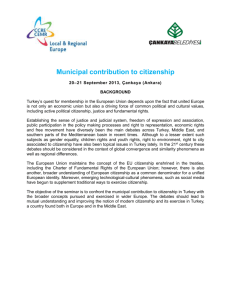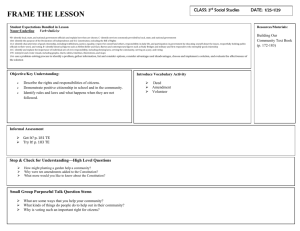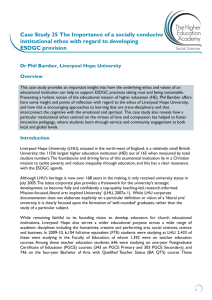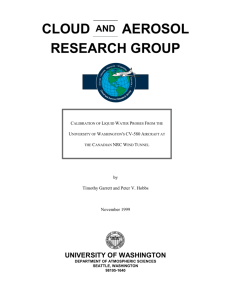BA Primary Teaching with QTS and Primary Education: Citizenship
advertisement
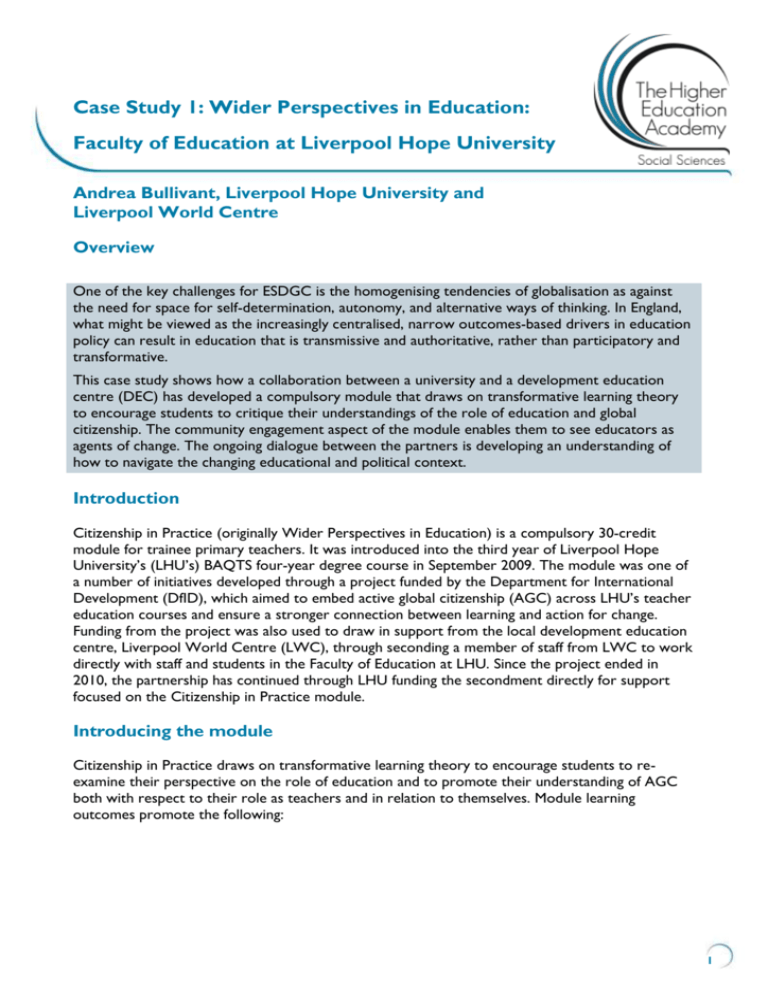
Case Study 1: Wider Perspectives in Education: Faculty of Education at Liverpool Hope University Andrea Bullivant, Liverpool Hope University and Liverpool World Centre Overview One of the key challenges for ESDGC is the homogenising tendencies of globalisation as against the need for space for self-determination, autonomy, and alternative ways of thinking. In England, what might be viewed as the increasingly centralised, narrow outcomes-based drivers in education policy can result in education that is transmissive and authoritative, rather than participatory and transformative. This case study shows how a collaboration between a university and a development education centre (DEC) has developed a compulsory module that draws on transformative learning theory to encourage students to critique their understandings of the role of education and global citizenship. The community engagement aspect of the module enables them to see educators as agents of change. The ongoing dialogue between the partners is developing an understanding of how to navigate the changing educational and political context. Introduction Citizenship in Practice (originally Wider Perspectives in Education) is a compulsory 30-credit module for trainee primary teachers. It was introduced into the third year of Liverpool Hope University’s (LHU’s) BAQTS four-year degree course in September 2009. The module was one of a number of initiatives developed through a project funded by the Department for International Development (DfID), which aimed to embed active global citizenship (AGC) across LHU’s teacher education courses and ensure a stronger connection between learning and action for change. Funding from the project was also used to draw in support from the local development education centre, Liverpool World Centre (LWC), through seconding a member of staff from LWC to work directly with staff and students in the Faculty of Education at LHU. Since the project ended in 2010, the partnership has continued through LHU funding the secondment directly for support focused on the Citizenship in Practice module. Introducing the module Citizenship in Practice draws on transformative learning theory to encourage students to reexamine their perspective on the role of education and to promote their understanding of AGC both with respect to their role as teachers and in relation to themselves. Module learning outcomes promote the following: 1 critical reflection on students’ own behaviour in light of their developing understanding of global learning and AGC and the debates around these concepts; making informed judgements about incorporating global learning within teaching practice and drawing on relevant pedagogical approaches; using futures thinking to connect learning and action for change. The course begins with a series of lectures which aim to stimulate rethinking about the role of education in the 21st century, and introduce students to key ideas and concepts familiar to global citizenship (GC), education for sustainable development (ESD) and other perspectives framed within the broad umbrella term of ‘global learning’. Throughout the course, there is a strong emphasis on underpinning pedagogical approaches such as co-operative learning, Open Spaces for Dialogue and Enquiry (OSDE) and Philosophy for Children (P4C), and relevant activities are incorporated into weekly seminar activities to enable students to explore these approaches. 2 Sample seminar activity BA Primary Teaching with QTS and Primary Education: Citizenship in Practice Seminar activity: Guidance for tutors Title: Global learning in the curriculum: using methods of enquiry Focus: Open Space for Dialogue and Enquiry (OSDE) Date: Aims/objectives 1. to understand the current curriculum context (the role of Government policy); 2. to reflect on the role of personal, social, health and economic education (PSHEE) as an avenue for global learning and explore wider issues in education; 3. to engage with the pedagogy of OSDE by participating in an enquiry; 4. to reflect on the advantages and pitfalls of enquiry as a learning approach. Seminar content: PART 1: Short discussion of the lecture – what stood out from it for you? Refresh OSDE principles: discuss what they have learned about, and think will create, a safe discussion place. What ‘guidelines’ might it have or need? start with the quiet personal reflection on the question sheet (e.g. How has education changed in your lifetime?). PART 2: Give out the stimulus sheet (with cartoons on it reflecting different perspectives on education). Group discussion and feedback in plenary – each group to share an idea. PART 3: Each group to select two priority questions to discuss from the ‘group dialogue’ questions e.g. How far should schools try and solve the problems of wider society? Group discussion and feedback in plenary. PART 4: Reflecting on the learning process. It is important in this session that you encourage the students to think about the learning process. What they have understood by enquiry approaches so far? Would it be useful in school? What might be its advantages in school? What might be the barriers and issues such an approach might raise, or face in a school context? Task for next session: Choose one question from the ‘group dialogue’ questions, and write your thoughts on it for the next seminar. Explicit links are made with current education policy and school initiatives, which correspond with aspects of global citizenship such as Eco-Schools and Fairtrade, and optional workshops are organised by the LWC seconded worker so that students can deepen their understanding of some of these issues. In 2011-12, the Fairtrade Foundation and a local representative delivered optional workshops from the charity Plantlife, who worked with a group of students on using wild spaces for learning in urban areas. 3 Community engagement projects A key component of the module is the requirement for students to engage in a nine-day community engagement project as an alternative to traditional school-based learning (SBL). This takes place in a local or international setting, either a school or community-based setting with a link to education. Students are encouraged to draw on models of action learning to negotiate and address an issue identified by the project provider, providing students with the opportunity to engage in issues that meet the educational needs of children in local settings, while promoting thinking beyond local contexts. Project themes range from supporting schools and community groups with sustainable living initiatives – such as food-growing and fair trade – to a collaboration with local police to address issues of diversity and cohesion in schools, and developing educational resources on behalf of an international charity which aim to promote different perspectives on people and places in the global south. Assessment Module assessment takes place through a Philosophy of Teaching assignment that requires students to critically reflect on their evolving views on education with reference to the module learning outcomes. Students are also assessed via a short presentation of their community engagement project, supported by an action plan identifying project objectives, tasks, outcomes and evaluation. The following action plan for a project on sustainable living and food growing in a primary school draws on Steve Pratchett’s (2008) Curriculum Model to Underpin Education for Sustainable Development, ‘Figure 1’: 4 Figure 1 Sustainable living action plan Key elements of success Module evaluations carried out during 2009-10 and 2010-11 indicated that the module was effective in promoting students’ understanding of global learning and awareness of the role they could play in making a difference in the world1. In 2010, the course team were awarded LHU’s Rector’s Award for Teaching Excellence in recognition of the module’s innovation and the impact on students’ learning. Further recognition came through an Ofsted inspection of teacher education at LHU in 2011, where the inspection team highlighted the module as an outstanding feature of provision. The community engagement project has clearly been one of the most successful aspects of the course. 81% of students in 2010-11 and 74% in 2011-12 identified the project as one of the three most positive features of the course, and for some it appears to have had a significant impact on 1 The proportion of students who rated the module as good or excellent rose from 66.6% in 2009-10 to 81.9% in 2010-11. At the start of the 2009-10 course, 82.8% of students reported they had little or no understanding of global learning, and 78.8% reported having little or no understanding of what they could do to make a difference in the world. By the end of the course, 81.8% reported having above average understanding of global learning, and 84.9% reported having a very good or excellent understanding of the role they can play in making a difference. 5 their emerging sense of their role as educators: The Wider Perspectives placement was fantastic – it has changed my whole view of teaching and what is important… I have learnt just how important education is for making a change, whilst realising my role as a global citizen. (BAQTS student, 2010-11) I saw how enjoyable it can be to develop a garden and grow your own vegetables. Consequently, I have begun to grow my own at home because I was excited to see how the vegetables will develop… I decided to find out the results for myself. It also helped towards learning about real life processes e.g. developing a garden requires planning, pricing up, replanning, hard work etc. (BAQTS student, 2010-11) The partnership The partnership between LHU and the local DEC (LWC) has been a key element in this success. The LWC staff member is directly involved in planning and delivering course content, and bringing expertise to bear in promoting the criticality needed for exploring global and social justice issues. The partnership also provides crucial links to schools and community settings in which projects take place, which is vital for meaningfully connecting theory and practice. The collaboration with schools and other project providers also promotes dialogue about the role of global learning in different contexts, nurturing a shared vision of developing practice between LHU, LWC and schools, and building capacity for this work in the face of a changing political and educational landscape. In an evaluation of projects carried out with 22 project partners in 2010, 19 indicated that projects helped to achieve broader school aims by promoting global citizenship and strengthening links with local communities: [An] excellent project that supported the work currently taking place in school. It enriches our curriculum and supports good practice promoting global citizenship across our school community… We identified P4C within primary as a priority area linking it to water and trees (deforestation) and both students were able to develop pupil’s thinking into these issues. (Chesnut Lodge SEN School) Schools and other project providers often become linked into wider initiatives taking place through LWC. For example, ten project schools will participate in training towards the Fairtrade Schools Award in 2012-13. Case studies from projects are also shared and disseminated in lectures and wider networks to inspire new cohorts of students and other teachers. Learning points and challenges A positive policy climate for global learning in the first two years of the module was helpful in providing clear links with key education agendas such as ‘sustainable schools’ and ‘community cohesion’. As the political and policy climate has altered, there has been a need to find new ways of locating this work within the wider educational landscape. The partnership between LHU and LWC helps to ensure there is ongoing dialogue and review of how to deliver concepts that are subject to question and debate. It provides links to local contexts and initiatives that can help 6 students ‘make sense of’ global learning in practice. An ongoing challenge is to promote critical engagement with global issues. While module evaluations demonstrate improvements in students’ understanding of global learning overall, a much smaller number of students reported an above average understanding of local-global connections and interdependence. This will be addressed by focusing on the theme of interdependence more explicitly in the course in 2012-13 and through ongoing dialogue with project providers. One of the key challenges is to balance the need for students to understand the nature of global learning as it currently takes place in schools and other project settings, while promoting critical awareness of the need to re-orientate education as a whole rather than through ‘one-off’ extra-curricular activities. One option being pursued for the next academic year is to develop links between projects in the UK and Norway, which could offer comparative approaches to outdoor learning and sustainability. Alongside the challenge of promoting greater criticality is the need to demonstrate impact on students’ future practice and action. The year three timetable is structured in such a way that students can act on their new understandings as they embark on a five-week SBL placement at the end of the academic year, but there is as yet no mechanism for evaluating the extent to which this occurs. However, funding has been provided recently for more in-depth evaluation of the impact of the module and projects – both on students, and children in six project schools – which may offer scope for more open-ended research and evidence of effectiveness in the future. Reference Pratchett, S. (2008) A Curriculum Model to Underpin Education for Sustainable Development [online]. Available from: http://esd.escalate.ac.uk/downloads/2002.pdf [Accessed 25 June 2013]. 7






